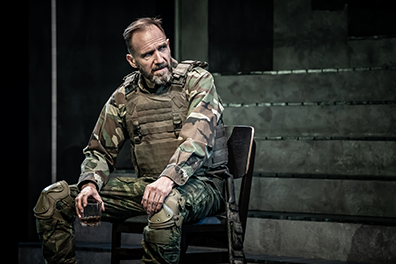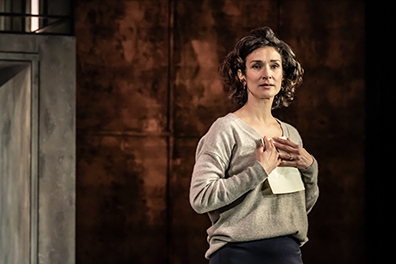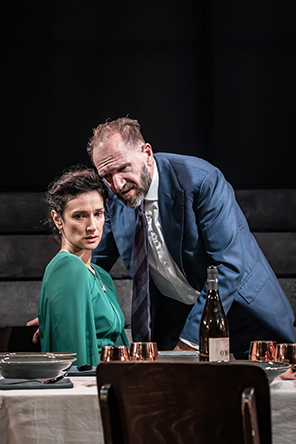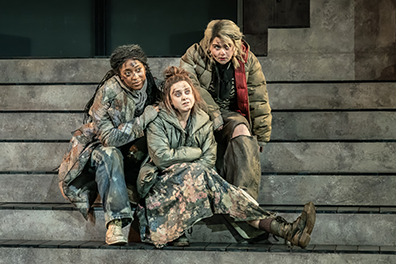Macbeth
War’s Tomorrow
Shakespeare Theatre Company, former BET Studios soundstage, Washington, DC
Thursday, April 11, 2024, F–109 (middle of middle grandstand left of thrust stage)
Directed by Simon Godwin

Ralph Fiennes as Macbeth, Thane of Glamis, Thane of Cawdor, and king hereafter in the Shakespeare Theatre Company's production of William Shakespeare's Macbeth. Fiennes joins with Shakespeare in demonatrating the working mind of a soldier with post-traumatic stress disorder. Photo by Marc Brenner.
Look at the face. As you walk through the door on your way to the theater, you pass a soldier—British, American, or from some other 2024 army—hanging out by a burned-out car. As you take in the whole battle-scarred landscape, be sure to look at the soldier’s face: a face we’ve seen in photographs from the American Civil War through two World Wars, Korea, Vietnam, Iraq, and into Ukraine and Palestine.
Minutes later you’ll see another such battle-weary soldier’s face, though one familiar to you not as a soldier but as one of the supreme Shakespeare actors of our time, Ralph Fiennes. Listen to that face as it takes you into his mental chambers where you will vividly see what is in the minds behind the faces from Antietam to Afghanistan.
The Simon Godwin-helmed production of William Shakespeare’s Macbeth, after premiering in Liverpool and stopping in Edinburgh and London, has finally landed in Washington, D.C., where Godwin is artistic director of the Shakespeare Theatre Company. To accommodate the immersive war experience Godwin sought, the production has taken up residence in a former BET soundstage. Set and costume designer Frankie Bradshaw has built a concrete bunker-like set on a deep thrust stage and costumed the soldiers in authentic-looking uniforms of today. Civilian dress, including Lady Macbeth’s casual sweater and pants and the Macbeths' and company's attire at the state banquet, are also modern. As we take our seats and await the play’s start, sound designer Christopher Shutt’s soundscape includes distant shelling, jet fighters flying by, a helicopter hovering overhead, and rockets screeching past, landing a bit too close for comfort. Three soldiers roam the stage—one even helps the ushers exhort the entering audience to move more quickly to their seats. One of the soldiers wears a medic’s arm band, and the third is older with a bloody wound on his temple. The three sit on the bunker’s steps and chat.
Finally, people are seated, the soldiers move to their positions in readiness, and the sound of a siren and loud explosion causes a blackout. In the darkness we make out what appears to be civilian survivors, refugees, moaning as they move distractedly onto the stage. Their moans pitch higher into screaming before combining to create a weird baying vocalization somewhere between Yoko Ono and Alanis Morissette. “When shall we three meet again? In thunder, lightning, or in rain?” one says. “When the hurly-burly’s done, when the battle’s lost, and won.” These are the witches that open Shakespeare’s play, and the suggestion here is that while they may be supernatural forces, they are a product of war.
As is the play’s protagonist.
Of all Shakespeare’s plays, including Titus Andronicus and The Two Noble Kinsmen, the language in Macbeth has always been hardest for me to grasp, particularly that of Macbeth himself. Much of the play happens inside his mind. Same is true with Hamlet, but the great Dane’s meditations follow logical steps as he works through his grief and uncertainties. The unmentionable Scot’s thoughts are more disjointed. Tonight, I hear it all vividly, and it all makes sense in how it doesn’t make sense: it’s the language—or, more accurately, the thinking—of a man with post-traumatic stress disorder.
I’ve been writing about PTSD for years while working on military magazines and congressional reports. On this website I have commented on Shakespeare’s understanding of the condition and long recognized the symptoms of PTSD in Macbeth—after all, this is a guy who unseams a man from the nave too th’ chops. Nevertheless, after having a more intimate experience with PTSD in the past year and now seeing Fiennes so completely engage the condition in his portrayal, I hear how in Macbeth Shakespeare presents a mind caught in the grip of disorder: Two minds, really, with Lady Macbeth, played by Olivier Award-winning Indira Varma, and maybe a third in Macduff (Ben Turner).
Fiennes is the most thoroughly PTSD-centric presentation of the Scottish warrior usurper king I’ve ever seen. Godwin’s production further emphasizes the mental environment of the condition in everything from its blocking—including encompassing the audience in the performance space—Jai Morjaria’s haunting lighting design, and, especially, Shutt’s and Sam Clarkson’s Sound Quiet Time sound system immersing us in the noises of war, murder, and fear itself while achieving a perfect mix for the actors’ voices.
The most important special effect, though, is Fiennes. His long experience with Shakespeare (I saw him play Romeo in London’s Regents Park in 1986 and Henry VI for the Royal Shakespeare Company at Stratford-upon-Avon in 1988) gives him such mastery of the text that he portrays in exquisite detail a mind “full of scorpions.”
He plants this seed with his very first line, wearily mounting the stage upon contending, “So foul and fair a day I have not seen.” Great Shakespearean imagery that may be, it also is a harbinger of Macbeth’s thinking patterns, more fully revealed in his first soliloquy upon learning that, in addition to being Thane of Glamis, he is Thane of Cawdor as the witches foretold. After self-debating whether the news is good or ill, he describes his own reaction not with logical syntax but a jumble of troubling images.
This supernatural soliciting
Cannot be ill; cannot be good. If ill,
Why hath it given me earnest of success,
Commencing in a truth? I am thane of Cawdor.
If good, why do I yield to that suggestion
Whose horrid image doth unfix my hair
And make my seated heart knock at my ribs,
Against the use of nature? Present fears
Are less than horrible imaginings:
My thought, whose murder yet is but fantastical,
Shakes so my single state of man
That function is smother'd in surmise,
And nothing is, but what is not.
Fiennes’ portrayal continues with more references to PTSD symptoms, including self-assessments of what he knows but quite can’t grasp is a mental illness.
- The dagger vision—and his explanation of the vision’s effect on him—is a delusion in a fully aware mind. “Art thou not, fatal vision, sensible to feeling as to sight? Or art thou but a dagger of the mind, a false creation, proceeding from the heat-oppressed brain?”
- In the post murder scene with Lady Macbeth, Macbeth fixates on how he could not say “Amen,” and how he heard a voice cry “Macbeth does murder sleep.”
- He “dare not” return to the murder scene and “look on’t again.”
- Then comes this awareness when he hears the knocking on the door: “How is’t with me, when every noise appalls me?”
- In his post coronation discussion with Lady Macbeth, Macbeth refers to nightmares and suicide. “But let the frame of things disjoint, both the worlds suffer, ere we will eat our meal in fear and sleep in the affliction of these terrible dreams that shake us nightly. Better be with the dead, whom we, to gain our peace, have sent to peace, than on the torture of the mind to lie in restless ecstasy.”
- When Banquo’s murderers tell him that Banquo’s son escaped, Macbeth says, “Then comes my fit again.” Interesting word choice, but he goes on to describe his need to cure his mind, a passage Fiennes speaks as an aside to the audience though the text doesn’t give that stage direction. “I had else been perfect, whole as the marble, founded as the rock, as broad and general as the casing air. But now I am cabin'd, cribb'd, confined, bound in to saucy doubts and fears.”
Such passages Fiennes delivers with a hounded aspect along with sudden starts and stops in his body language. Yet he speaks with poignant clarity, finding deliberate purposes in word choices unusual for a warrior hero well experienced in battle and demonstrating unstinting fealty to his sovereign.

Indira Varma as Lady Macbeth in the Shakespeare Theatre Company's production of William Shakespeare's Macbeth. Varma's Lady Macbeth builds a friendship with the audience, taking us into her confidence as she plots King Duncan's murder and keeps her husband on task. Photo by Marc Brenner.
The question of when Macbeth begins thinking of murdering that king is unequivocal in this production: it comes right after Duncan (Keith Fleming, playing the king as an agile politician) proclaims his eldest son, Malcolm (Ewan Black) as Prince of Cumberland and heir to the throne. “That is a step on which I must fall down or else o’er-leap, for in my way it lies,” says Macbeth, Fiennes giving his lines a frustrated edge. Immediately, though, he wants to hide his “deep desires” from the stars and says, “The eye wink at the hand; yet let that be which the eye fears, when it is done, to see.” He’s leaving his path up to fate: which turns out to be his wife.
Reading aloud Macbeth’s letter about his encounter with the witches, Varma’s Lady Macbeth points to the paper and nods to the audience. Fiennes’s soliloquys, though he direct-addresses the audience, are focused inward. Varma is more like Iago with her soliloquies, taking us into Lady Macbeth's confidence as she plots Duncan’s murder and keeps her husband on task. When she invokes the spirits “that tend on mortal thoughts” to “unsex me here, and fill me from the crown to the toe, top-full of direct cruelty,” the audience are those spirits. Varma implores us not just with her words but with flirtatious exhortations, and the audience on this night find her so delightful it seems more than willing to be complicit in her drive toward regicide. Indeed, Lady Macbeth makes such good friends with the audience that Varma gets laughs on lines that would otherwise astonish us, such as, “Had he not resembled my father as he slept, I had done” the murder.
Lady Macbeth’s hold on her husband is threefold; through her intelligence, her sheer will, and her sexuality. “Screw your courage to the sticking place,” she tells him, a line Varma delivers with its full, vulgar subtext present, his “courage” and her “sticking place” referencing another kind of screwing; “and we’ll not fail” is the promised climax. It’s no wonder that, even as she goes on to detail her role in the plot—administering the sleeping potion to the two chamberlains—Macbeth is still thinking sexually. “Bring forth men-children only; For thy undaunted mettle should compose nothingggggg but males,” he says, holding on to the last letter of nothing like Sammy Davis Jr. holding a note beyond its intended metered phrase, so musical is Fiennes's delivery, so sexual is this interaction between the Macbeths in the throes of planning their king’s murder. These Macbeths share a sincerely deep love upon his arrival home; yet when she immediately starts plotting the king's murder, Fiennes’s Macbeth nervously responds, “We will speak further.” He knows what Lady Macbeth is capable of.
This may be power dynamics in the marriage, at least to the degree it has reached at this stage of their relationship. It’s also Lady Macbeth being unable to grasp the scorpions crawling through her husband’s brain cells. No matter how much or well he tries, he can’t make her understand. While she’s disturbed and embarrassed by Macbeth’s behavior upon seeing Banquo’s ghost at the state dinner, her admonition to him is telling in the buttons she pushes:
This is the very painting of your fear:
This is the air-drawn dagger which, you said,
Led you to Duncan. O, these flaws and starts,
Impostors to true fear, would well become
A woman's story at a winter's fire,
Authorized by her grandam. Shame itself!
Ironically, she will ultimately suffer from PTSD, revisiting Duncan’s murder scene through her troubled dreams and apparently resorting to suicide.

Lady Macbeth (Indira Varma) cannot fathom what's going on in the mind of her husband (Ralph Fiennes) in the Shakespeare Theatre Company production of William Shakespeare's Macbeth. Photo by Marc Brenner.
One bit of stage business, however, is puzzling. After their non-discussion on his plan to murder Banquo, Macbeth ends the scene by telling her, “Thou marvell'st at my words: but hold thee still. Things bad begun make strong themselves by ill. So, prithee, go with me.” Fiennes, trying to reconnect with the passion that he and Lady Macbeth have long shared, reaches out his hands to her. Varma steps away, signaling her Lady Macbeth is not in the mood. Fiennes’s Macbeth gives a resigned of-course shrug and walks off. This is the first time I recall seeing Lady Macbeth initiate a schism in their love. Nothing in the text indicates such a dynamic, it felt out of place for me watching it, and confused my companion, a friend since our college days, who had read Macbeth but was seeing it for the first time. It does, however, further emphasize that Lady Macbeth is incapable of empathizing with her husband’s condition.
Fiennes and Varma are the production’s above-the-title draws, but Godwin has assembled an accomplished cast for a production that never lets up in intensity. Steffan Rhodri’s Banquo establishes a chemistry of solid camaraderie with Fiennes’s Macbeth, which makes Macbeth’s betrayal of him more pronounced—Macbeth whining how he took the trouble of murdering Duncan only for Banquo’s issue to ultimately wear the crown, as the witches prophesied. Pointedly, though, when Rhodri’s Banquo brings up the Weird Sisters on the evening of the king’s murder, he's surprised at Macbeth’s answer: “I think not of them.” Even Fiennes realizes how perfunctory his answer was and tries to further engage in the topic, but too late to waylay the seed of suspicion being planted in Banquo’s mind—a suspicion that builds through the murder’s aftermath and Macbeth’s coronation. The murderers kill Banquo by slitting the back of his neck (also true for Macduff’s kids), and additing to the spattering blood are the victims' blood-curdling screams. For Banquo, Lady Macduff (Rebecca Scroggs) and her children (Adrianna Weir and Mila Weir alternating with Kiyoko Merolli and Maxwell Kwadjo Talbert) performing death by violence through both vocal and visual suffering wields more emotional impact than do spewing blood bags.
Turner gives a contained portrayal of Macduff, interesting in that he has good reason to be suffering from PTSD, too, given not just his war experience but also hearing of the slaughter of his “wife, children, servants, all that could be found.” Turner pauses in silence an agonizingly long time after Ross (Ben Allen) delivers the details before saying in a quiet, disbelieving voice: “My children too?” When Malcolm urges Macduff to exact revenge on Macbeth, Turner delivers his line, “He has no children,” in a straight, matter-of-fact tone. “Dispute it like a man,” Malcolm pushes. “I shall do so,” Macduff replies with just a hint of irritation; “But I must also feel it as a man,” wherupon Turner lets the sobs come.
A trademark of Godwin’s Shakespeare productions is streamlining the action through cuts, consolidations, and turning text into visuals (Emily Burns is credited with adapting the text). The England scene begins with Macduff entering the presence of Malcom hooded and manacled, reiterating how Malcolm trusts absolutely no one visiting him from Scotland. However, many a Shakespeare purist will get their shorts tied up in knots to learn that this production drops entirely the Porter scene between Duncan’s murder and the murder’s discovery. To replicate the effect of creating a comic moment in that interim, a single but truly funny line is amplified: Lennox (Richard Pepper) goes on and on about how the “night has been unruly,” whereupon Fiennes delivers Macbeth’s response, ’Twas a rough night,” with such enforced nonchalance it gets a huge laugh from the audience who has seen how rough a night Macbeth has had, not to mention Duncan. Macduff then hollering from off stage, “O horror, horror, horror!” cuts off the audience laughter.

The Weird Sisters (Danielle Fiamanya, Lucy Mangan, and Lola Shalam) may be supernatural witches but also seem to be a product of war in the Shakespeare Theater Company's production of William Shakespeare's Macbeth staged at the former BET sound studio in Washington, D.C. Photo by Marc Brenner.
We don’t see the thanes’ gradual exodus from Macbeth’s court, but we do see that the only entourage Macbeth has in the latter half of the play is Banquo’s murderers (Michael Hodgson and Jake Neads, who doubles as Donalbain, Duncan’s youngest son falsely accused of being a murderer). The murderers accompany Macbeth on his second visit with the witches, who make Hodgson and Neads instruments for their apparitions. Seyton (Jonathan Case), whom Shakespeare names only in the Dunsinane scenes that end the play, is given a full arc in this production. He starts out as a young aide-de-camp brimming with frantic energy generated by his enthusiasm to please the thane and his lady. He gives Lady Macbeth news of Duncan’s imminent arrival to their castle. His enthusiasm turns to confusion as he's made privy to Macbeth’s plot to kill Banquo. He warns Lady Macduff (Scrogs) of her impending peril. He accompanies the Doctor (Scroggs), the medic in the preshow, watching Lady Macbeth sleepwalking. “You have known what you should not,” the Doctor tells Seyton, and Case frantically replies, “She has spoke what she should not!” Per the text, he delivers to Macbeth the news that Lady Macbeth is dead. After the increasingly appalled Seyton watches Macbeth disintegrating before his eyes, this production inserts a moment for Seyton to join the rebellion as Macduff and the English army arrive at Dunsinane, his arc having reflected from start to finish the Macbeths’s disintegration.
The English army’s arrival at Dunsinane by way of Birnam Wood is impressive and effective as the company descends down the aisles carrying large tree branches. It perfectly visualizes how Malcolm intended the device to serve as camouflage for the advancing army, and how Macbeth would see it as the entire forest moving per the apparition’s warning.
From first to last, the witches have their say—not necessarily in words but in their presence. Lucy Mangan, Danielle Fiamanya, and Lola Shalam are on or around the stage (and sometimes among the audience) for much of the play. As Malcolm delivers the play’s last speech, promising reconciliation for Scotland, the witches sit on the steps and laugh. The rest of the company leave the stage, but the witches remain to blackout, pleased smiles on their faces as they look at the audience. We are reminded how this production started, with seeming refugees vocalizing woe emerging from war—be it in ancient Scotland according to the story or in 2024 according to the production.
The hurley burley of war has third and fourth and more order of consequences, from displaced civilians to mental illness to betrayals, murders, and wholesale slaughter. Macbeth is a product of war, and his wife an accessory to its consequences. One of those consequences is her death, which prompts Macbeth to say,
She should have died hereafter;
There would have been a time for such a word.
Tomorrow, and tomorrow, and tomorrow,
Creeps in this petty pace from day to day
To the last syllable of recorded time,
And all our yesterdays have lighted fools
The way to dusty death. Out, out, brief candle!
It’s a cycle we can’t seem to break.
Eric Minton
April 19, 2024
Revised on second viewing April 23, 2024
Addendum: Filmed Version
Simon Godwin filmed this production before a live audience during its London run and screened it at the Shakespeare Theatre Company’s Harman Hall theater before releasing it to cinemas.
For a filmed version of a staged production, it is brilliantly accomplished. Moving cameras and many edits add to the tension without being distracting. The film also captures the singular staging elements of Godwin's production.
The film opens not with the soldiers lounging on the stage as the theater production does but in the back stage area where the soldier stands near the burned-out car. The Weird Sisters one by one appear in this space, and just as the soldier notices them, the siren and explosion sounds which leads to the witches crawling on stage with their rising moans. The cameras also capture the movement of Birnam Wood through the audience, not only from stage level and from behind the audience but also through the backstage tableau as they exit.
As is the wont of live theater, the acting evolved over the course of the run. As such, the movie gives us different perspectives of the two lead performances from what we saw in the Washington, D.C., staging—which came after the production’s filming. Ralph Fiennes’s gave a more refined, subtle rendering of Macbeth in D.C. than he does in the film’s representation of his London performance. His hammy behavior post murder becomes distractingly over the top. Indira Varma’s small-screen acting chops, meanwhile, enhance her Lady Macbeth on the large screen as we can better see her facial expressions and subtle gestures—and the thoughts motivating them—than we could from the stage (especially if our seats were on one side of the deep thrust stage).
These performance shifts consequently change the dynamics of the scene I criticized in my review in which Lady Macbeth shuts down her husband’s sexual advances. Fiennes’ more amped-up Macbeth leering and pawing at his wife as he speaks allegorically of murdering Banquo—the night scarfing up the tender eye of pitiful day, crows making wing to rooky woods, night’s black agents rousing to their prey—comes across as increasingly creepy to Varma’s Lady Macbeth.
In that creep-out passage, Macbeth refers to “the bloody and invisible hand cancel and tear to pieces that great bond which keeps me pale.” Bond proves to be the key word in this passage. Every Shakespeare performance I see, including multiple viewings of a single production, sheds new light on some aspect of the play. This screening reveals the strong bond that Banquo and Macbeth have established long before their meeting the witches on the heath, where Banquo calls Macbeth his “noble partner.” As I notd in my original review, Banquo’s verse readings emphasize his deep understanding of Macbeth. The movie allows us to better see Banquo’s similarly close relationship with Lady Macbeth, too. That, in turn, deepens her trepidation about her husband’s behavioral turn: Murdering our king, that’s brave ambition; murdering our best friend, that’s just wrong.—Eric Minton, May 20, 2024
Comment: e-mail editorial@shakespeareances.com
Start a discussion in the Bardroom



 Find additional Shakespeareances
Find additional Shakespeareances